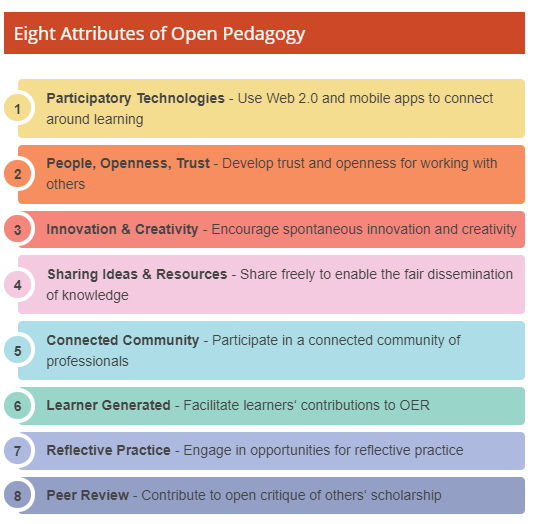OER Toolkit – Teaching
Teaching
Through open licensing, OER opens up possibilities for new, more collaborative teaching and learning practices—because the materials can be used, adapted and shared within and across learning communities. This module explores Open Pedagogy—collaborative teaching and learning practices that help educators to advance a culture of sharing and active learning through OER. The module also suggests ways that educators can work with library staff to further their practice of Open Pedagogy.
Open Pedagogy
What is Open Pedagogy?
Open Pedagogy refers to collaborative teaching and learning practices that help educators to advance a culture of sharing and active learning through OER.
Below is a framework for Open Pedagogy, proposed by Bronwyn Hegarty. Developing “openness” can be challenging. For example, educators may be uncomfortable sharing their work or inviting peer review in open platforms. Open Pedagogy does require a change in mindset to develop openness and work in a specific way; however, most educators already collaborate and share, and the attributes listed below are about extending that current practice.

Sources:
- Bronwyn Hegarty’s Eight Attributes of Open Pedagogy, Podcast Transcript, from the Alberta Open Educational Resources Initiative, licensed under CC BY SA
- What is Open Pedagogy Wikieducator, licensed CC BY SA
Why Open Pedagogy Matters?
It matters because:
- It supports students in developing critical-thinking, problem-solving, and analytical skills.
- It enables educators to expand their academic competencies, and create more collaborative, engaging learning experiences for students.
- Overall, it helps to democratize teaching and learning.
Here are some ways that faculty can benefit from other staff expertise in the implementation of Open Pedagogy.
- Peer Review: Find staff who have expertise in digital accessibility and information literacy (often the school librarian). They can review and help align your OER to accessibility requirements and information literacy learning outcomes/objectives.
- Resource Sharing: Find staff who know metadata, licensing, and how to best organize digital materials to enable the widespread sharing of the OER that you create (often the school librarian or technical support personnel).
- Participatory Technologies: Find staff who have experience with authoring and publishing platforms, and with Web 2.0. They can guide you; on the use of these technologies, toward the design of course projects, and content that engage students around OER (often librarians or other teachers with OER experience).
- Connected Community: As representatives of your district, all staff can help explore new channels (perhaps other school districts) and approaches to OER outreach and community building. They can also serve as potential partners on presentations and training that inspire others to participate in OER.
Below is a list of resources that will help you get started in Open Pedagogy.
Open Educational Practice Rubric: Adaptable professional learning rubric from ISKME, which is intended to guide educators as they incorporate OER into their practice.
Instructor Basics: How to Use Wikipedia as a Teaching Tool: Simple guide from Wikimedia Foundation on how to use Wikipedia as part of student assignments (Sample of Open Pedagogy Lesson)
OER Academy: Open Educational Practice for Curriculum Improvement: Part of a series of Modules to teach more about OER provided by ISKME within the OER Commons Hub. You will need to be logged into your free Nebraska OER Commons account to access the resource.




